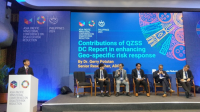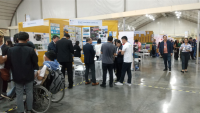14-18 October 2024 (Manila,Philippines)
QZSS, which stands for Quasi Zenith Satellite Systems, is referred to as "Japanese GPS" due to similarities of functions such as positioning and communication. Mr Gerry POTUTAN, senior researcher at ADRC, highlighted the contributions of QZSS in improving early warning systems (EWS) during his presentation in the partner event that ADRC co-organized with Japan International Cooperation Agency (JICA), Japan Aerospace Exploration Agency (JAXA), and other regional and local partners at the Asia-Pacific Ministerial Conference on Disaster Risk Reduction (APMCDRR), 14-18 October 2024 in Manila.
Firstly, QZSS can transmit early warning message to mountainous and island areas that have limited access to Wi-Fi, internet, or cellular networks, thereby augmenting their early warning systems. Secondly, QZSS can serve as a back-up system for transmitting warning messages to communities-at-risk when ground telecommunication systems are damaged in a disaster. Since QZSS is also a positioning satellite system, warning messages can be transmitted specifically to disaster-affected communities. Details of the session are available at the following link: https://apmcdrr.undrr.org/conference-event/urban-resilience-metropolises-incorporation-multi-sectoral-spatial-risk-assessment.
ADRC also exhibited posters showcasing its activities on: 1) promoting satellite observation and messaging services for disaster risk management, 2) utilizing Information and Communications Technology for Community Based Disaster Risk Management (ICT for CBDRM), and 3) implementing capacity building programs for comprehensive disaster risk reduction.
On the last day of the conference, ADRC representatives joined a field visit to Marikina City and Pasig City to learn more about the JICA project "Pasig-Marikina River Channel Improvement," which includes river widening to further minimize the impact of flooding in Metro Manila.
(2024/10/25 15:00)



